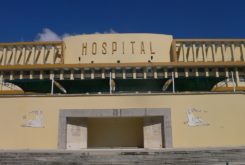With a three-week nationwide lockdown being enforced, South Africa’s economy has grinded to a halt, putting neighbouring economies, including Mozambique’s, into further strains amid the Coronavirus outbreak. Cause of particular concern is a possible drop in Mozambican energy exports for South Africa. Reduced imports from China could also lead to a price spike in some types of products.
According to analysts at Mozambican bank MozaBanco, the “worsening economic situation” in South Africa,the biggest regional economy and Mozambique’s largest trading partner, is one of the most negative consequences of the Coronavirus lockdown.
“Exports from Mozambique to South Africa (mainly energy and gas) may be affected by reduced demand in the neighboring country, thus impacting the evolution of GDP in Mozambique”, according to MozaBanco´s most recent analysis on economic developments.
Under the current lockdown in South Africa, all but essential movement is forbidden and both the army and the police are enforcing the measures. Border crossings with Mozambique have been shut, to stem the spread of Covid-19.
In the current context, Mozambique is also expecting a setback due to trade relations with China, which is the source of about 12% of its imports. “In this way, (Mozambique) may suffer some supply disruptions (particularly of building materials and electronic products), causing some upward pressure on the general price level in the economy”, MozaBanco says.
“The export activity of Mozambique is less exposed to China, as the latter represents only 6% of sales of national products (titanium, wood and cotton)”, MozaBanco adds.
In a recent assessment of the Covid-19 pandemic, the Bank of Mozambique (BdM) concludes the country´s economy faces an impact, both direct and indirectly.
“The fact that Mozambique has a relative exposure to trade with China stands out” in terms of direct impacts. China is currently responsible for 9.1% of the country’s total trade volume.
“With the prolongation of the virus, there may be less internal availability of products from China, especially construction materials and different machinery, which could compromise the dynamics of some sectors of economic activity (construction and agriculture)”, BdM says. Additionally, it adds, there is the possibility of reducing of volume of exports to China, “which would result in the worsening of the current account deficit”.
“Indirectly, “Mozambique may suffer from falling prices and demand for commodities in the international market”. Recent Balance of Payments data (2019) suggest that major projects (including thermal coal and aluminum exporters) account for 69.49% of the country’s global exports.
In terms of inflation, part of the products that make up the Consumer Price Index (CPI) in Mozambique come from China, and impact is expected “with the restriction in their supply”.
Less availability of goods imported from China, the BdM says, may contribute to a rise in domestic prices and inflationary pressures due to higher prices for import products and the effect of the exchange rate, in a scenario of scarcity of foreign exchange, due to lower export earnings.
According to MozaBanco, in light of the current crisis, the Mozambican government “should evaluate the use of tax and non-tax incentives to minimize the impact of the contraction of business activity and the level of employment in the economy”.
“Foreign exchange injection initiatives in the financial sector may also provide greater capacity to meet the needs of importing basic goods into the country”, adds MozaBanco in its recent analysis.
Fear of the impact in Tourism, Transport and other sectors of the economy has already lead BdM to put in place support measures, including pumping money into the financial system.
Starting on March 23, and for a period of nine months, BdM will “introduce a foreign currency line of credit for institutions participating in the Interbank Foreign Exchange Market, in the global amount of US $ 500 million”, according to a statement by BdM.
It also authorized “the non-constitution of additional provisions by credit institutions and financial companies in cases of renegotiation of the terms and conditions of the loans, before their maturity, for the clients affected by the pandemic”.
The national railways and ports company, CFM, has also imposed restrictions on transports. Starting today, according to a CFM statement received by CLBrief, all long-distance trains are cancelled. This includes those in the southern railway system (to Ressano Garcia, Goba and Chicualacuala) as well as the central (Moatize and Marromeu).
The impact of the current global economic slowdown may even force a revision of growth estimates for the next few years, sustained by the launch of the natural gas industry in Cabo Delgado province.
According to a recent report from the Reuters news agency, ExxonMobil group is expected to postpone approval of its natural gas project in the Rovuma basin, northern Mozambique, due to the effects of the new coronavirus and the current scenario on international markets.
The US group announced last week it was considering “significant” cuts in capital expenditure and operating costs, in line with other groups and companies that have reduced expenses due to the abrupt drop in oil prices as well as in demand as a result of a contraction in economic activity.




